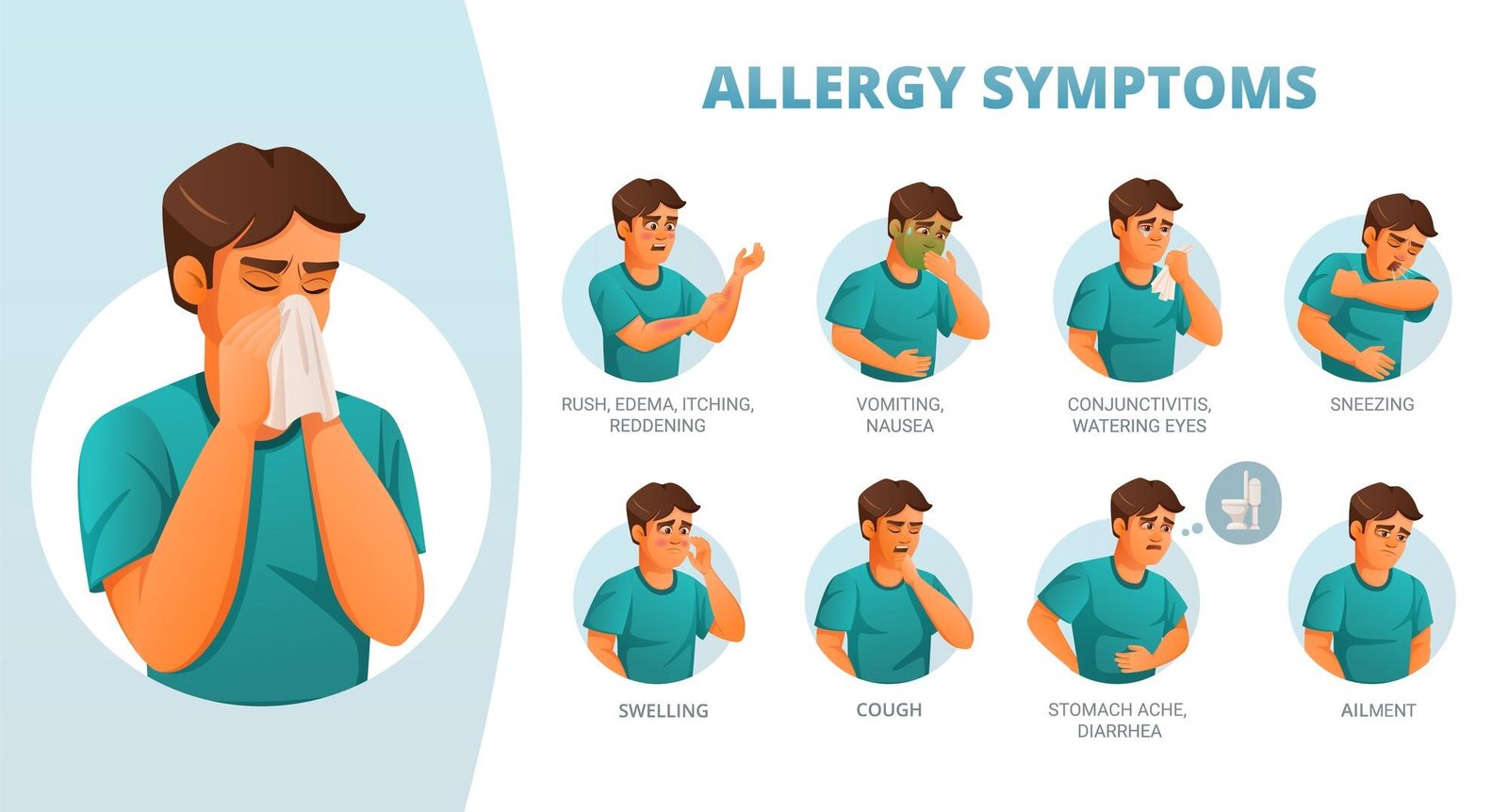
Allergies occur when your immune system reacts to a foreign substance — such as pollen, bee venom or pet dander — or a food that doesn't cause a reaction in most people.
LETS UNDERSTAND FEW THINGS ABOUT ALLERGY IN DETAIL
- Your immune system produces substances known as antibodies.
- When you have allergies, your immune system makes antibodies that identify a particular allergen as harmful, even though it isn’t.
- When you come into contact with the allergen, your immune system's reaction can inflame your skin, sinuses, airways or digestive system.
- The severity of allergies varies from person to person and can range from minor irritation to anaphylaxis — a potentially life-threatening emergency. While most allergies can't be cured, treatments can help relieve your allergy symptoms.
Symptoms
Allergy symptoms, which depend on the substance involved, can affect your airways, sinuses and nasal passages, skin, and digestive system. Allergic reactions can range from mild to severe. In some severe cases, allergies can trigger a life-threatening reaction known as anaphylaxis.
Hay fever, also called allergic rhinitis, can cause:
Sneezing
Itching of the nose, eyes or roof of the mouth
Runny, stuffy nose
Watery, red or swollen eyes (conjunctivitis)
A food allergy can cause:
Tingling in the mouth
Swelling of the lips, tongue, face or throat
Hives
Anaphylaxis
An insect sting allergy can cause:
A large area of swelling (edema) at the sting site
Itching or hives all over the body
Cough, chest tightness, wheezing or shortness of breath
Anaphylaxis
A drug allergy can cause:
Hives
Itchy skin
Rash
Facial swelling
Wheezing
Anaphylaxis
Atopic dermatitis, an allergic skin condition also called eczema, can cause skin to:
Itch
Redden
Flake or peel
Anaphylaxis
Some types of allergies, including allergies to foods and insect stings, can trigger a severe reaction known as anaphylaxis. A life-threatening medical emergency, anaphylaxis can cause you to go into shock. Signs and symptoms of anaphylaxis include:
Loss of consciousness
A drop in blood pressure
Severe shortness of breath
Skin rash
Lightheadedness
A rapid, weak pulse
Nausea and vomiting

Affected Areas
NOSE
Allergic rhinitis, or also known as hay fever, is a response to specific allergens. This condition occurs when our body comes into contact with any kind of allergen, it releases a natural chemical called histamine that helps you to defend the disease. But in most cases this chemical ends up causing allergic rhinitis.Symptoms are:
Sneezing
Stuffy nose
Runny nose
Itchy nose
Sore or scratchy throat
Coughing
Watery eyes
Itchy eyes
Throat
Sore throat that is also known as Postnasal drip is the main cause when the allergy hits the throat. It is the result of exposure to some kind of allergen and happens only when the clogging in the sinuses drains down the throat area. This causes tickling or an itchy kind of pain.Symptoms are:
Cough
Bad swelling
Constant irritation in the throat
Speaking Difficulty
Lungs - ASTHMA
The medical condition of asthma is one that is most often the result of allergies. When any kind of allergen is inhaled into the lungs, it causes the lining of the lungs passage to swell up making it very difficult to breath. It is a condition that produces extra mucus making the passages narrow and small which results in wheezing.Signs and symptoms of Asthma would include:
Shortness of breath
Tightness or pain in the Chest
Difficulty in sleeping due to wheezing and cough
A mild whistling sound while exhaling
Stomach- IBS
Consuming very rich or spicy food can cause stomach upset. In this situation, you may have gas trouble, loose motion or even constipation. Allergies from various kinds of food like dairy products, sea food, certain nuts and dry fruits, or even eggs. Cow milk is known to produce colic, asthma and other sever concerns in infants if they are allergic.IBS – Irritable Bowel Syndrome is a combination of belly discomfort with pain and problem with bowel movements that a state of either going too much or too less. This is not a life threatening case but surely it could change your lifestyle and approach towards life.
Symptoms are:
Diarrhea or constipation
Pain in the stomach that fades away after bowel movement
Huge amount of gas along with bloating feeling
Stools being harder or looser than normal times
Stress
Skin- ECZEMA
The skin is one feature of your body that gets affected the most in the shortest span of time. Normally the skin would turn dry, itchy, or red or may produce small bumps on the face that look very similar to insect bites. This is mostly due to food allergy. ECZEMA – Eczema which is commonly known as dermatitis is a skin condition where one experiences inflammation of the skin due to redness, constant itching, and an outbreak of lesions. Eczema is a long-term inflammatory condition which can be treated if diagnosed in the early stages. Although this is not a sever condition, it is definitely a life changing concern.Common Symptoms are:
Dry and sensitive skin
Inflamed or red skin
Severe itching
Dark colored patches
Rough and scaly patches seen of the skin
Oozing and swelling

DIAGNOSIS
To evaluate whether you have an allergy, your health care provider will likely:
Ask detailed questions about signs and symptoms
Perform a physical exam
Have you keep a detailed diary of symptoms and possible triggers
If you have a food allergy, your provider will likely:
Ask you to keep a detailed diary of the foods you eat
Ask if you've stopped eating the suspected food during the allergy evaluation
However, be aware that these allergy tests can be falsely positive or falsely negative.
Skin test.
Your skin will be pricked with small amounts of the proteins found in common allergens. If you're allergic, you'll likely develop a raised bump (hive) at the test location on your skin.Blood test.
Specific IgE (sIgE) blood testing, commonly called radio-allergosorbent test (RAST) or ImmunoCAP testing, measures the amount of allergy-causing antibodies in your bloodstream, known as immunoglobulin E (IgE) antibodies. A blood sample is sent to a medical laboratory, where it can be tested for evidence of sensitivity to possible allergens.TREATMENT
ALLERGY TREATMENT INCLUDES:
Allergen avoidanceMedications
Immunotherapy
Homoeopathy

Homeopathic management of Allergies:
Treatments to allergies are many in number.
The most important step before treating allergies is to understand what the problem is and what is causing the allergy and how to stay away from it.
Medication for allergies are available like eyes and nasal spray to instantly clear the passage, inhalers to helps breathe better and tablets that help to suppress the allergy.
But what is required is to strengthen the system from the roots and ensure that immune system is strong enough to fight these allergens.
That’s what homeopathy medication does.
It treats the condition from deep within and improves the strength of the system.
They are extremely safe as they are obtained from natural substances.
